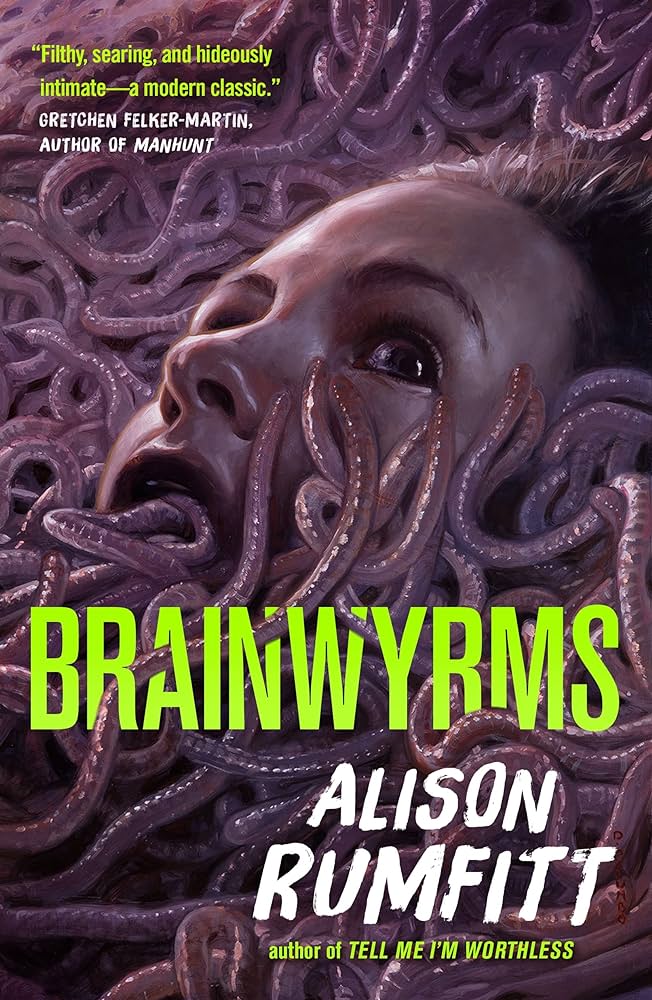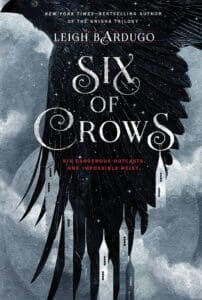
Synopsis
When a transphobic woman bombs Frankie’s workplace, she blows up Frankie’s life with it. As the media descends like vultures, Frankie tries to cope with the carnage: binge-drinking, sleeping with strangers, pushing away her friends. Then, she meets Vanya. Mysterious, beautiful, terrifying Vanya.
The two hit it off immediately, but as their relationship intensifies, so too does Frankie’s feeling that Vanya is hiding something from her. When Vanya’s secrets threaten to tear them apart, Frankie starts digging, and unearths a sinister, depraved conspiracy, the roots of which go deeper than she ever imagined.
Shocking, grotesque, and downright filthy, Brainwyrms confronts the creeping reality of political terrorism while exploring the depths of love, pain, and identity.
Review
The rundown: Brainwyrms follows the nascent love affair between two broken people: Frankie and Vanya. Both are all but crippled by a lifetime’s worth of trauma, both old and new, and their relationship is characterized by brutal fetish play and emotional abuse. Frankie, a trans woman, is obsessed with the idea of being impregnated, a fetish that can never be fulfilled, while Vanya is part of a very niche fetish group that receives satisfaction through the introduction of parasites into their own bodies. This stunted affair plays out in a kind of nightmare reality of terrorist bombings, TERF cabals, and an omnipresent online presence that is, at one point, compared to God.
Two things should be clear from this brief synopsis: that this is a novel jam packed with ideas and that it is thoroughly, aggressively, and vomit-inducingly disgusting. These are, I think it’s safe to say, its selling points.
Unfortunately, it is not particularly thought-provoking. Neither is it ever able to induce much emotion in the reader beyond revulsion, with even the very real horrors of abuse and physical violence becoming subsumed in a tidal wave of filth. This latter may well be intentional, but it’s also unfortunate.
Rumfitt’s break-out book, Tell Me I’m Worthless, covers much of the same ground, and yet I found it to be —if not what I would call enjoyable—brilliant in its execution, harrowing, and impossible to stop thinking about.
One thing that separates these two books is the fact that Tell Me I’m Worthless barely operates as a novel. It has characters of very similar types as found in Brainwyrms: damaged, cruel, and terminally online. But in Tell Me I’m Worthless, they barely operate as characters. They are, rather, avatars in a book that is less a novel and more a manifesto, a primal scream in the wilderness of a late capitalism rolling swiftly over into fascism.
This last points to the unique way in which Rumfitt’s books operate. This is less horror with social commentary than something closer to straight allegory. In Tell Me I’m Worthless, there is a haunted house, but neither the house nor the haunting are particularly important. The house is England, and the specter haunting it is fascism, erupting everywhere, but most specifically in the TERF hordes.
It’s hard to put my finger on just what makes that work in Tell Me I’m Worthless and fall so flat in Brainwyrms, but at least part of it is that the latter book is covering so much of the same ground so fascinatingly and brutally covered in the former. And, finally, Brainwyrm’s ideas are just less interesting.
The worms of the title are transphobia, and it is a communicable parasite, infecting everyone. But it is also a sexual fetish, at first interesting, then obsessive, and finally overwhelming everything, necessary for self-satisfaction and transforming one’s very ideologies. To be clear, this is not interpretation but paraphrase. These are ideas presented explicitly in the course of the novel through the thin mask of Vanya, who is the book’s authorial voice but is also always “you,” in its second person address, except when you is You, the reader, who is also directly addressed.
This could all add up to something fascinating, but in the end, the allegory feels as week as a biting internet comment (you’ve got the brainworms), and the ideas are finally not very interesting. Vanya/Rumfitt’s analysis of TERF ideology as sexual fetish offers little more than warmed-over Freudianism. That is, these violent TERF’s don’t even realize that they are driven by a sexual need that has been sublimated into this horrific ideology.
Okay. And then what?
As you might expect, this story does not have a happy ending, but it’s hard to imagine any ending that is happy in this universe. At one point, there’s a little riff on Leonard Cohen’s line, “There are cracks in everything… That’s how the light gets in,” which is rejected for not recognizing the structural decay of a world that has cracks in everything, but Brainwyrms could really benefit from even the slightest ray of light. Instead we have characters trapped in endless cycles of abuse and self-harm, in a world where consent is meaningless, where real human connection appears impossible, and where, also, there are endless descriptions of parasites spilling from every orifice.
It’s not so much that I expect some message of hope. By page two one should have abandoned such ideas. It’s more a matter of asking “So what?” The book’s climax seems to point to a genuine desire for annihilation, and the sequel to Brainwyrms might look something like Beckett’s late fiction, with Vanya crawling through endless fields of shit, trying to remember if she’d been happy, back when there was a world. The book screams out another of those careworn Freudian tropes: the death drive, and it wraps this drive up in “extreme” horrors that make the reader think that maybe, just maybe, annihilation isn’t too bad of an idea.
In the end, I have the sense that for every one of my complaints about the book, the author would simply nod along and say, “Yes, and?” and it might be true that this book simply isn’t for me, but Rumfitt’s abilities are so clear, and so startling, that I hope her next book offers some small way in, and maybe just the smallest ray of light, if only to better frame the darkness.








Leave a Reply